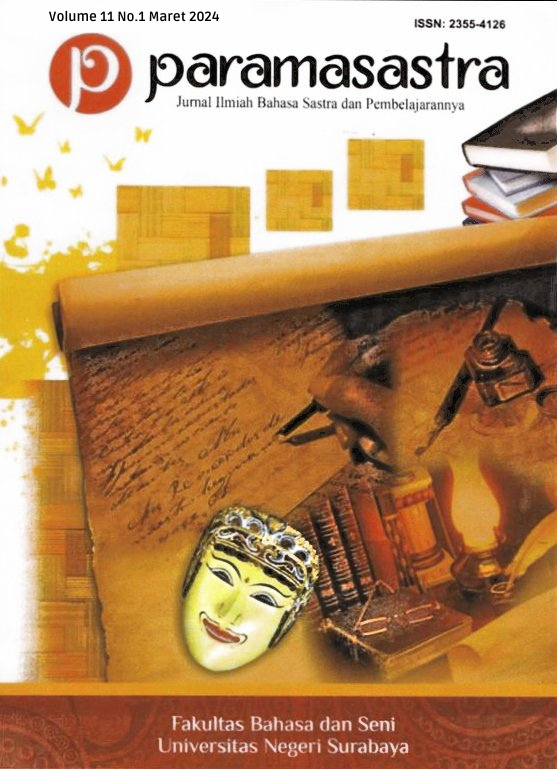VOICING THE VOICELESS: DESPAIR AND HOPES IN MIGRANT WORKERS’ SELECTED DIGITAL POEMS
DOI:
https://doi.org/10.26740/paramasastra.v11n1.p96-115Abstract
This research scrutinises six digital poems written by migrant workers from Indonesia, India, the Philippines, China, and Bangladesh. In their digital poems, the migrant workers honestly shared their experience and feelings in times of Covid-19. Based on the problems, this research was conducted to unveil the effect of the pandemic on the migrant workers’ life. In conducting this research, the researchers use library research method and collect the data through documentation. This research employs New Criticism to highlight the complex issues faced by the migrant workers. Furthermore, Subaltern theory plays crucial role in investigating the power relations depicted in the digital poems and how the migrant workers can empower themselves and speak up their minds. This study unmasks how the migrant workers voiced their problems through the choice of words, symbols, and elements of literature. In their poems, the migrant workers illustrate their anxiety, loneliness, sadness, depression, and how they badly miss their families and homes. In addition, this research also highlights the migrant workers’ struggle to overcome the complex situation during lockdowns in Singapore. In conclusion, the digital poems are essential for the migrant workers to accommodate their voices, promote solidarity, and share their collective experiences during the lockdowns.
References
REFERENCES
Ashcroft, B., Griffiths, G., & Tiffin, H. (2007). Post-Colonial Studies. New York: Routledge.
Barnet, S., Burto, W., & Cain, W. E. (2008). An Introduction to Literature. New York: Pearson Longman.
Billore, S. & Anisimova, T. (2021). Panic Buying Research: A Systematic Literature Review and Future Research Agenda. International Journal of Consumer Studies. 45(4). 777-804. https://doi.org/10.1111/ijcs.12669
Brameswari, C. (2021). Social Media Literature Works as Media of Communication During Covid-19 Pandemic. Proceedings of the 5th English Letters Undergraduate Conference, 12-21. https://www.usd.ac.id/fakultas/sastra/sasing/f1l3/ELUC17/proceeding%20ELUC%202021%20compressed.pdf
Cabalquinto. (2021). (Im)Mobile Homes: Family Life at a Distance in the Age of Mobile Media Studies. Oxford: Oxford University Press.
Chan, L. G. & Kuan, B. (2020). Mental Health and Holistic Care of Migrant Workers in Singapore during the COVID-19 Pandemic. J Glob Health. 10(2). 1-5. https://doi.org/10.7189/jogh.10.020332
Dobie, A. B. (2012). Theory into Practice: An Introduction to Literary Criticism. Boston: Wadsworth.
Esposo, S. L. [@globalmigrantfestival]. (2020), June 13. Covid-19 Cooking Lesson [Post]. Instagram. https://www.instagram.com/p/CBYA1C5l218/?utm_source =ig_web_copy_link
Goggin, G., & Zhuang, K. V. (2023). Apps, mobilities, and migration in the Covid-19 pandemic: Covid technology and the control of migrant workers in Singapore. International Journal of Cultural Studies, 26(6), 636-654. https://doi.org/10.1177/13678779231160802
Keyl, S. (2017). Subaltern Pedagogy: a Critical Theorizing Of Pedagogical Practices for Marginalized Border-Crossers. International Journal of Critical Pedagogy, 8(1), 173-194. https://core.ac.uk/download/pdf/234819649.pdf
Kim, F. (2021). International Migration Needs More Than Just Collective Attention; It Needs Collective Action. https://reliefweb.int/report/world/international-migration-needs-more-just-collective-attention-it-needs-collective-action.
Lee, C. (2021). Online Grocery Markets: Impact of Pandemic on Consumers. https://www.iseas.edu.sg/wp-content/uploads/2021/03/ISEAS_Perspective_2021_40.pdf
Loomba, A. (2005). Colonialism/ Postcolonialism (2nd ed.). Oxon: Routledge.
Madrah, M. Y. & Praptawati, D. (2021). Alienation and Hopes in Indonesian Migrant Worker Literature Work. Journal of Culture, English Language, Teaching & Literature, 21(1), 38-52. https://doi.org/10.24167/celt.v21i1
Poole, S. (2022). Migrant Workers Rights in Singapore: Advocacy, Legal Framework and Prospected for Change. https://weai.columbia.edu/news/migrant-workers-rights-singapore-advocacy-legal-frameworks-and-prospects-change#:~:text=COVID%2D19%20further%20exacerbated%20these,passes%20to%20leave%20their%20dormitories
Rengarajan, N. [@globalmigrantfestival]. (2020), June 9. Globalisation [Post]. Instagram. https://www.instagram.com/p/CBN4UuWlCht/?utm_source=ig_ web_copy_link
Sarkar, S. (2019, August 16). Poetry of the Proletarians. Mint Lounge. https://lifestyle.livemint.com/news/talking-point/poetry-of-the-proletarians-111641455366572.html
Uddin, M. D. Sharif. [@globalmigrantfestival]. (2020), June 7. The Death of Wishes [Post]. Instagram. https://www.instagram.com/p/CBIwBMGl0rE/?utm_source =ig_web_copy_link
Warminingsih. (2020). Poetry From Migrant Workers Shines a Light on Their COVID-19 Plight. https://thekopi.co/2020/05/17/poetry-migrant-workers-covid-19/
Wei, H. [@globalmigrantfestival]. (2020), June 12. Under the Pandemic [Post]. Instagram. https://www.instagram.com/p/CBUpBBWlTIr/?utm_source=ig_ web_copy_link
Downloads
Published
How to Cite
Issue
Section
 Abstract views: 324
,
Abstract views: 324
, PDF Downloads: 194
PDF Downloads: 194












